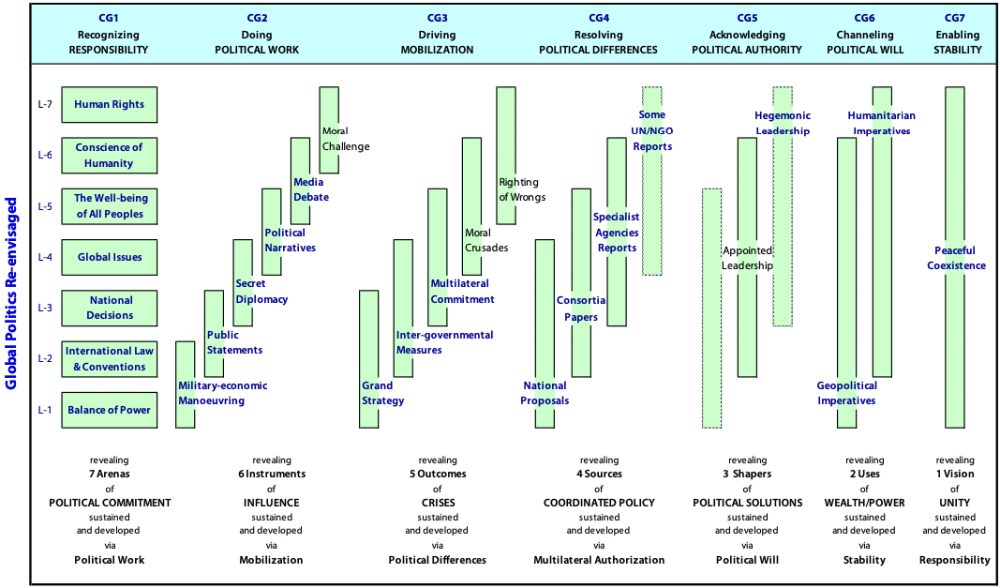Political Activities Amongst Nations
While most of the participative phenomena are recognizable in geopolitics, there is one thing missing: a centralized coercive power (i.e. world government) that can ensure implementation of choices.
We examine geopolitical activities in the light of the Framework of determinants of geopolitical choice and the principles discovered in relation to political activities in a society.
The actors in geopolitics are primarily national governments, but trans-national or global organizations and even occasionally individuals concerned with humanity's well-being play a role.
These fundamentals are significantly different in practice if not always in name:
replaces .
replace .
replace .
replace .
replaces .
replaces .
replace .
is more specific than .
Governments may move troops or ships or commission new weapons to assert dominance. Economic measures like tariffs and foreign aid may also be used to send messages about power and aims.
replace .
Senior politicians use addresses given ostensibly for benign reasons to send messages about intentions and interests. For example, they may use a state of the nation speech, a speech at a military graduation or to the business community. Government leaders or their spokespersons also regularly face journalists, singly or together, to give particular messages.
replaces
Government leaders often meet together privately when what is said is never revealed. Secrecy may be used for a variety of reasons e.g. when foreign countries are demonised for political gain, necessary diplomacy must be pursued in secret.
replace
To deal with global issues, governments and pressure groups tell stories that are often far removed from reality while claiming to be for the good of all.
The equivalent amongst nations is possibly debate at the United Nations General Assembly, Security Council and other Committees. NGOs rarely engage with government leaders in the regular way that interest groups interact with politicians.
remain.
NGO’s may challenge governments in regard to atrocities, and human neglect in association with natural disasters or cruel dictators.
Mobilization seems essentially unchanged .
replaces
Nations of any size currently attempt to be as powerful as possible in their region if not in the world.
replaces
In the face of a global crisis (e.g. the recent financial collapse, the climate change issue), governments may form groups that propose a range of measures that will be taken by each.
replaces
In the face of needs that transcend borders, it is possible national governments will commit themselves to making certain changes.
occur.
For some time, there has been a crusade against evils, like world poverty and people trafficking, mainly driven by non-governmental action but occasionally joined by governments.
Governments have taken a crusade against drug cultivation and trafficking, where legalization and regulation would provide a far safer, healthier and cheaper outcome.
remains.
Nations often have great difficult acknowledging past errors in regard to other countries e.g. Japan, re atrocities of the former militaristic regime; Turkey, re the Armenian genocide.
are the equivalent of vested interests.
(e.g. UNO, EU, APEC) produce papers.
(e.g. WHO, FAO) make recommendations in Reports.
may be the equivalent. do surveys and present documented findings, ideas, and impassioned pleas.
Better viewing: Use browser zoom if needed.

There is no authority that can definitively shape solutions. In the absence of world government, authorization reverts back to national governments.
There is no significant elected leadership on the world stage.
is found within governments and within the various international bodies and NGOs.
replaces because the most powerful nation (or nations) seek to become leaders in their region or even globally. Some small countries can show leadership in particular areas without the use of brute power cf. Switzerland, which in the 20th century had a special role because of its long-standing neutrality.
Money allocated to global bodies (e.g. UNO, NGOs) is available for use.
usually dominate activities of national governments that use the wealth provided by their citizens.
usually dominate activities of NGOs and charitable foundations with global reach. Where NGOs are predominantly funded by governments, then humanitarian activities may be impeded or blocked.
See other applications of this framework:
Originally posted: August-2009; Last updated: 15-Nov-2010. Amended 15-Nov-2023.